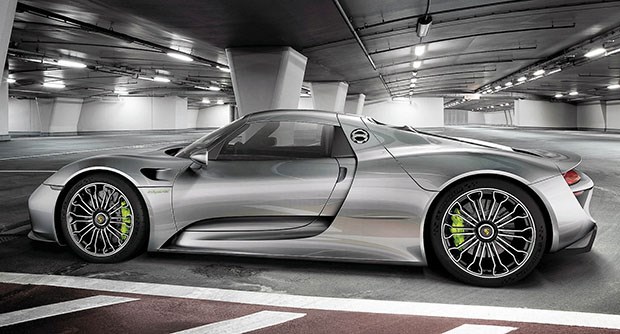Porsche has at long last officially taken the wraps off of its much-ballyhooed 918 Spyder plug-in hybrid super sports car, unveiling it at the Frankfurt Auto Show in Germany just as it kicked off production in September.
The German automaker will build only 918 - Get it? 918? - of these cars over the next 18 months, and after test driver Marc Lieb broke the record for the quickest lap (for a production car) on the 20-kilometre, 170-turn NYrburgring Nordschleife course in Germany, it's safe to say Porsche won't have trouble selling all 918 in a hurry. More on that in a bit.
Rest assured, Porsche's new halo car is every bit as ridiculous - in a good way - as its US $845,000 price tag and 214 mph (340 km/h) top speed would suggest. No, $845,000 is not a misprint.
While the MSRP for the fantastic 2014 Porsche 911 Turbo is a still-stout $200,000-plus, the 918 Spyder costs nearly five times as much.
Of course, if the princely price tag of the 918 Spyder seems ridiculous, it's only because it is. And so are its technical specifications. Mounted in the middle of the Yber Porsche is a
599-horsepower, 4.6-litre gasoline engine. There are no turbochargers or power adders of any kind; that's all motor.
Add a pair of electric motors - one at each axle - and the 918 Spyder produces 887 net horsepower and an astonishing 940 pound-feet of torque, making it the most powerful production Porsche ever built.
All that gets put to the ground through a sevenspeed paddle-shift manual transmission that drives all four wheels when the gasoline engine is operating or just the front wheels under electric-only power.
There's a switch on the steering wheel that lets drivers select one of five modes: E-Power, which allows for up to 29 kilometres of driving on the batteries alone; Hybrid, for maximum efficiency and minimal fuel consumption; Sport Hybrid, for higher performance; Race Hybrid, with added performance; and Hot Lap, which presumably allows the driver to leave Earth's atmosphere.
OK, not really, but you get the idea. It's all-out, nolimits performance. But what about weight? Batteries and electric motors add a lot, right? Well, the chassis is made from a combination of carbon fibre, aluminum, magnesium and titanium. That, along with composite body panels, keeps the overall weight to about 1,640 kilograms, which is a couple hundred more than a Chevrolet Corvette.
The 918 Spyder also comes with removable roof panels that allow it to be used as either a coupe or a roadster, according to Porsche, although with the roof panels stored in the nose it looks more like a targa top than a true roadster.
With a decent curb weight and 887 horsepower, acceleration is child's play. Zero to 100 km/h takes 2.8 seconds, while zero-to-200 km/h comes up in 7.9 seconds and 300 km/h flies by in 23. Not only is this the most powerful production Porsche ever, it's also the fastest.
Porsche also offers the "Weissach" package, which shaves off 35 kilograms thanks to such tricks as making the roof, rear wings, rear-view mirrors and frames of the windscreen from carbon fibre. There's also less sound insulation, light magnesium wheels and the use of film-coating instead of body paint. All that for just 35 kilograms? Wow.
Now, the NYrburgring. Lieb's record-setting lap was six minutes and 57 seconds, the quickest ever recorded by a true production car. By comparison, the Wall Street Journal wrote that the Lexus LFA ran 7:14, the Chevrolet Corvette ZR1 7:19 and the outstanding Ferrari 458, a positively leisurely 7:32.
Of course, once word of Lieb's spectacular lap got out, it went viral on the Internet. And, not surprisingly, orders went through the roof.
"We have taken deposits for more than two-thirds of the planned production volume," a Porsche spokesman told British enthusiast publication Autocar.
"Interest is increasing by the day."


